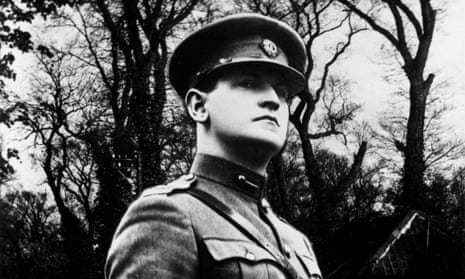Michael Collins rose to prominence during the Easter Rising of 1916, and was a key figure in Ireland’s battle for independence from Britain in the 1920s. However, his decision to sign the Anglo-Irish Treaty in December 1921 proved controversial, leading to his death at the hands of anti-treaty forces during the Irish civil war.
Michael Collins killed in ambush
24 August 1922
Michael Collins, commander-in-chief of the Irish army, was killed in an ambush near Bandon, county Cork, within a few miles of his birthplace, on Tuesday night.
Accompanied by several leading Free State officers, he was visiting the National Army’s posts in south Cork and was returning to Cork City by byroads owing to obstacles on the main road. He was accompanied by an armoured car and a bodyguard. There were about 20 men altogether in the party.
The Irregulars, who are said to have numbered about 200, had been almost beaten off when Collins was shot in the head. It was clear from the first that the wound was fatal, but he went on firing. His last words were: “Forgive them. Bury me in Glasnevin with the boys.”
Michael Collins: a portrait of the Irish republican leader
24 August 1922
Among many people here with recent Irish experience, the belief is that the death of Michael Collins means a new stage of bitter guerrilla fighting, and a period of reprisal and counter-reprisal. “It will put the clock of Ireland back five years,” said one observer who had seen many exciting months in Ireland.
Click to read the article in full.
Editorial: the death of Mr Collins
24 August 1924
Ireland has suffered another cruel loss, and the foul blow of a treacherous ambush has struck down the man whom at this moment she could least spare.
There has been a definite attempt to remove a political enemy by death. This is commonly called assassination. We need not concern ourselves about words. The fact remains that the chief remaining leader of the Irish Free State has been treacherously struck down, and that the faction which is responsible for his death actually claims to supersede him, and those who have acted with him, in the leadership of a people which by every means in its power have repudiated them.
The death of Mr Collins may well mark a turning point in the conflict which is devastating Ireland and bringing a reproach in the eyes of the world upon her people. Mr Collins had a great name among his countrymen. He was full of courage, full of resource. And he was moderate and conciliatory as well as prompt in action and regardless of danger. It is this element of recklessness, native to the Irishman and intensified no doubt in him by years of peril and adventure, which probably is in part responsible for his death. Such qualities have endeared him to his countrymen, but they are possessed, it may be, in no less degree by others among his comrades. What will be harder to supply is his experience in command and the conduct of large affairs.
This is an edited extract. Click to read the editorial in full.
Michael Collins: the man and the fighter
By Stephen Gwynn
The Observer, 27 August 1924
Since O’Connell no Irish leader has been so purely and typically Irish as Micheal Collins. His name has an English sound, but 300 years ago it was used in Munster as the equivalent for O’Colan. Gael he was by descent; but what he knew of Irish he probably learnt in London, where he went in 1907 as a lad of 16 to be a Post Office sorter. Seven years he spent among the group of young men and women in London, who, rallying round the Gaelic League, despised the parliamentary party. But he kept in him the stamp of the farmer’s son from west Cork, with the passion for race meetings and every form of jovial sport. You had only to see and hear him to recognise the big, impulsive, demonstrative nature, the big, solid, yet athletic farm, which were O’Connell’s. And there was in him, too, the astuteness which Ireland admired in O’Connell. However the pact which preceded last June’s elections be judged, it was a duel in which Michael Collins got the better of Éamon de Valera.
Click to read the article in full.
English motor-driver shot by IRA
30 August 1924
Edward Isherwood, a young English motorman, was taken from the house in which he was living in Cork early yesterday morning by masked men, who charged him with having driven General Michael Collins on his last journey. Isherwood was afterwards shot and left for dead with a card pinned on his breast: “Convicted spy. IRA. Beware.” Isherwood, however, was only wounded in the ankle and arm and feigned death. After lying for two hours he crawled for a mile and a half, when he met a woman who secured help. He is now in hospital.
